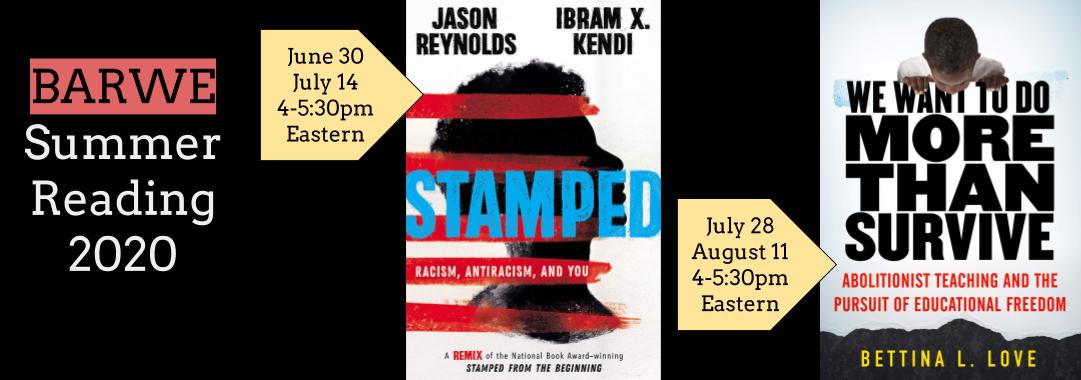Thanks to everyone who voted in our poll to decide this year’s Summer Reading books. It was close - and there was a lot of excitement about all of the texts. We are pleased to announce that we have decided to focus our summer reading series on our top 2 selections: Stamped by Jason Reynolds & Ibram X. Kendi and We Want to Do More Than Survive by Bettina Love.
We will host two online meetings about each text, and facilitate an online discussion in the weeks prior to each meeting (likely through a Facebook group, keep an eye out for the link to join). Dates for our online meetings (all 4-5:30pm Eastern Time):
We’ll send out RSVP links prior to each online meeting, and then share Zoom links with folks who register. All updates will come through our mailing list - so if you haven't yet, please subscribe here.
We encourage everyone to buy their books from Black-owned bookshops. Here is a great list of Black-owned bookstores across the country. Here is a more extensive list that you can use to find a Black-owned store near you. If you know of a great Black-owned bookstore we should shout out, please reply with it to our email or send it to us on social media, @barwe215 on Instagram and Twitter.
We also want to acknowledge that many Black-owned bookstores have been swamped with orders in recent weeks. Be patient with these shops, and don’t hassle or rush owners to get you books. If you want to support these businesses at this moment, donations are the best way to go.
We also realize that these books have gone out of stock at many suppliers in recent days, given the surge in interest in antiracist work. Hopefully booksellers will restock soon, but in the meantime we encourage you to consider audio or e-book options.
Many folks have recommended libro.fm as a great place to get audiobooks. They will give a portion of your purchase to local bookshops, and you can choose where that money goes. We recommend choosing a Black-owned shop. You can choose Philly shops like Harriett’s or Uncle Bobbie’s, or a shop near you.
If you end up having to purchase the texts from a corporate bookseller, or if you access it for free online, we recommend that you make a donation to a Black-owned shop or Black-led racial justice organization. Harriett’s Bookshop in Philly is accepting donations through their Venmo, $HarriettsBookshop.
We will host two online meetings about each text, and facilitate an online discussion in the weeks prior to each meeting (likely through a Facebook group, keep an eye out for the link to join). Dates for our online meetings (all 4-5:30pm Eastern Time):
- June 30 - Stamped
- July 14 - Stamped
- July 28 - We Want to Do More Than Survive
- August 11 - We Want to Do More Than Survive
We’ll send out RSVP links prior to each online meeting, and then share Zoom links with folks who register. All updates will come through our mailing list - so if you haven't yet, please subscribe here.
We encourage everyone to buy their books from Black-owned bookshops. Here is a great list of Black-owned bookstores across the country. Here is a more extensive list that you can use to find a Black-owned store near you. If you know of a great Black-owned bookstore we should shout out, please reply with it to our email or send it to us on social media, @barwe215 on Instagram and Twitter.
We also want to acknowledge that many Black-owned bookstores have been swamped with orders in recent weeks. Be patient with these shops, and don’t hassle or rush owners to get you books. If you want to support these businesses at this moment, donations are the best way to go.
We also realize that these books have gone out of stock at many suppliers in recent days, given the surge in interest in antiracist work. Hopefully booksellers will restock soon, but in the meantime we encourage you to consider audio or e-book options.
Many folks have recommended libro.fm as a great place to get audiobooks. They will give a portion of your purchase to local bookshops, and you can choose where that money goes. We recommend choosing a Black-owned shop. You can choose Philly shops like Harriett’s or Uncle Bobbie’s, or a shop near you.
If you end up having to purchase the texts from a corporate bookseller, or if you access it for free online, we recommend that you make a donation to a Black-owned shop or Black-led racial justice organization. Harriett’s Bookshop in Philly is accepting donations through their Venmo, $HarriettsBookshop.
